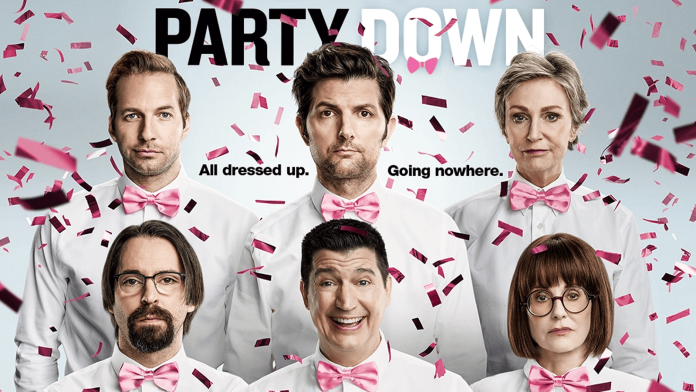Party Down & Failure
Hollywood loves its myths. Not only adapting or borrowing from the classical ones, but their own myths. The ones that built that city and industry.
I won’t pretend to be above them. I love Karina Longworth’s outstanding podcast You Must Remember This, I love biographies of old Hollywood, and stories behind how films were made. I love these things because I love movies and television (perhaps to an unhealthy degree).
In my years spent consuming these legends, I have often come across the same idea, talent is always discovered in the end. This, as much as anything else, is the foundational myth of that city. As an industry they don’t want to admit (to themselves or the world) the truth. That it’s chance. That the universe is chaos and the ones who make it are no better or worse than the ones who don’t.
Now, this isn’t to say there aren’t talented people in Hollywood. It isn’t to say they didn’t work hard (we won’t get into the nepo babies that so populate that industry). It’s just to say that for every talented, hard-working person who made it, there are dozens more who didn’t.
And that’s what makes Party Down (the short-lived Starz show that just received a revival) so wonderful. The characters in that show aren’t going to make it. Casey isn’t going to become a famous comedian, Kyle isn’t going to be a movie star, Roman isn’t going to be the next George Lucas (who he hates for not being hard sci fi). It’s a show about the failures that litter the streets of Los Angeles. They are each, as the show so elegantly puts it, “just another grain of sand on that endless fucking beach.”
No, Party Down isn’t the only piece of media from Hollywood that details the lives of those who won’t make it. Notably I would point to the noir masterpiece Sunset Blvd. as another example. But Sunset Blvd.uses the failure as a catalyst. Joe Gillis, the languishing screenwriter in the film, needs to be driven away from the town and his craft for the film to unfold. His great failure is minor in the grand scheme of things. He’s already, in many ways succeeded. He’s had films made, he works on another during the film, and, in the end (and the beginning) he meets a spectacular fate.
No one is meeting a spectacular fate in Party Down. No one is taking a long, deep swim in the pool of a former film star. They’re all just there, working in the food service industry, trying desperately to believe in Hollywood’s foundational myth.
This is why I had mixed feelings about the revival. I loved the show when I first watched it (years ago when I was parking cars at events like the ones depicted in this show), but a part of me was happy it ended when it did. If it had continued, they would’ve felt the need to advance the characters, to show them succeed.
Think of The Office or Parks and Recreation or Community, other shows ostensibly about failure. As they dragged on into the later seasons, they needed to give their characters victories. They needed to transform themselves from shows about failure into shows about success.
I think there was a subtle pleasure in the fact that Party Down didn’t do that. That it was cancelled before it devolved into some saccharine parody of itself. There was something poetic about it, like this show about failures needed to fail to be true to itself.
I’ve only seen the first episode of the revival (already too many of them have succeeded for my taste) and I’m holding out hope that it’ll deliver. There’s a part of me that’s thrilled to have it back, to get to return to those characters after all these years. To get to see what new and creative ways the writers have found for them to fail. But there’s another part of me that wishes it had stayed what it was, a show about failure that failed.
(Also, I already miss Lizzy Caplan.)
